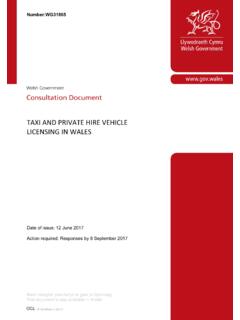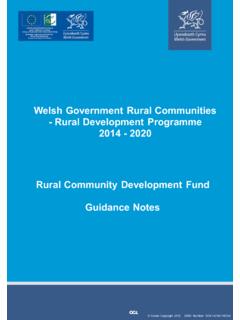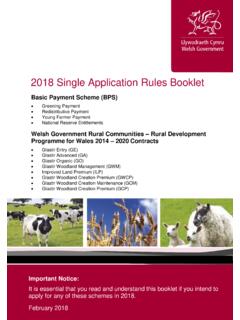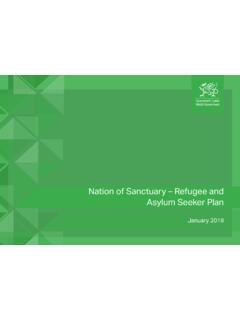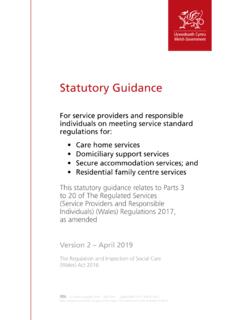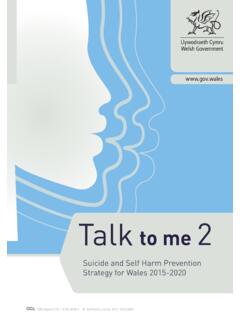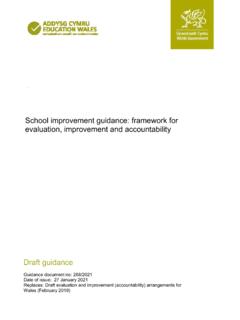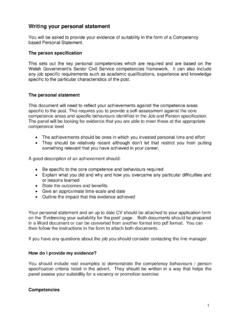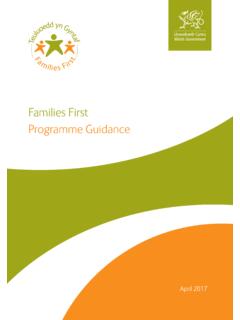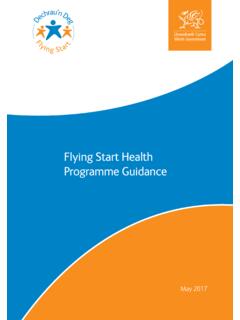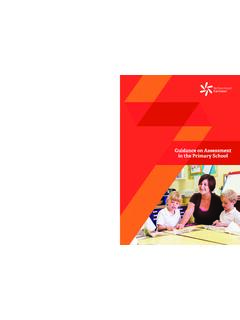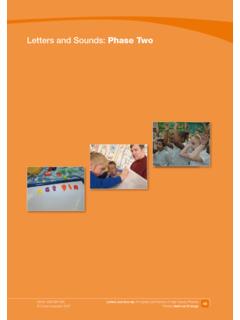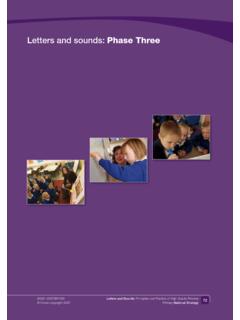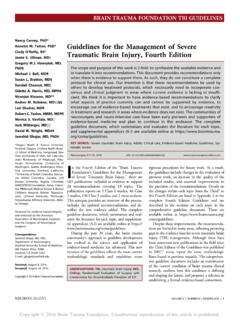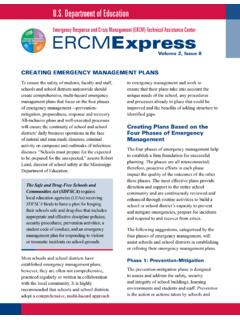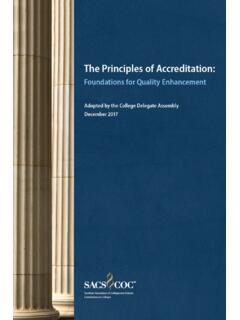Transcription of Foundation Phase Profile Handbook - GOV.WALES
1 Foundation Phase Profile HandbookFoundation Phase Profile Handbook AudienceHeadteachers, teachers, practitioners, governing bodies of maintained schools and practitioners and management committees in the non-maintained sector in Wales; local education authorities; teacher unions and school representative bodies; church diocesan authorities, national bodies in Wales with an interest in education and parents/carers. OverviewThis document sets out the Welsh Government s requirements as part of the Early Years Development and assessment Framework (EYDAF) and supports assessment of children s learning and development throughout their time in the Foundation requiredHeadteachers, teachers, practitioners, governing bodies of maintained schools and practitioners and management committees in the non-maintained sector in Wales must ensure that the statutory requirements set out in this document are implemented in line with the date specified.
2 Further informationEnquiries about this document should be directed to:Early Years TeamDepartment for Education and SkillsWelsh Government Cathays ParkCardiffCF10 3 NQe-mail: copiesThis document can be accessed from the Learning Wales website at Related documentsCurriculum for Wales: Foundation Phase Framework (2015) r ddogfen yma hefyd ar gael yn document is also available in Welsh. Crown copyright September 2017 WG32346 Digital ISBN 978 1 78859 477 6 ContentsIntroduction 3 The Foundation Phase Profile 4 Using the Foundation Phase Profile 5 Observation and assessment 10 Child development 13 Personal and Social Development, Well-being and Cultural Diversity 15 Social interaction (Compact Profile ) 16 Behavioural regulation (Compact Profile ) 18 Response to others (Compact Profile ) 20 Independence in personal care (Compact Profile )
3 22 Engagement 24 Emotional expression 26 Personal and Social Development, Well-being and Cultural Diversity glossary 28 Language, Literacy and Communication Skills 29 Oracy Listening and understanding (Compact Profile ) 30 Oracy Phonological awareness (Compact Profile ) 32 Oracy Expressive language (Compact Profile ) 34 Reading Understanding reading materials (Compact Profile ) 36 Oracy Collaboration and presenting information and ideas 38 Oracy Speech 40 Oracy Talking and play 42 Reading Comprehension 44 Reading Reading words 46 Writing Handwriting 48 Writing Spelling 50 Writing Punctuation and grammar 52 Writing Genre 54 Writing Planning, evaluating and editing 56 Language, Literacy and Communication Skills glossary 57 Mathematical Development 59 Reciting and sequencing numbers (Compact Profile ) 60 Counting (Compact Profile ) 61 Shape (Compact Profile ) 62 Pattern (Compact Profile )
4 64 Reading and writing numbers 65 Properties of number 66 Fractions 67 Measures and units 68 Time 70 Data recording and representation 72 Data sorting and grouping 74 Addition and subtraction 76 Managing money 78 Multiplication and division 79 Temperature 80 Angle and position 81 Estimating and checking 82 Mathematical Development glossary 83 Physical Development 85 Holding a mark-making implement (Compact Profile ) 86 Coordinated movement (Compact Profile ) 88 Drawing (Compact Profile ) 90 Fine manipulation (Compact Profile ) 94 Using scissors and tools 96 Improving performance 98 Physical Development glossary 99 Annex A: Skill ladders from the Compact Profile 100 Annex B: Using the Record Form 101 Annex C: The Compact Profile Form 102 Annex D.
5 The Full Profile Form 104 Foundation Phase Profile |3 IntroductionPurpose of the Foundation Phase Profile As a key part of the Welsh Government s Early Years Development and assessment Framework (EYDAF), the Foundation Phase Profile (the Profile ) supports assessment of children s learning and development throughout their time in the Foundation Phase . Its main purpose is to provide a nationally consistent baseline assessment which aligns with end of Phase outcomes. Through the use of observations and formative assessments, the Profile supports practitioners to provide a developmentally appropriate holistic curriculum for all children.
6 The Profile has been designed to line up with assessments carried out by health professionals and also supports early identification of possible developmental delay, special educational needs (SEN), or additional learning needs (ALN); this will ensure support is given to children who need it. The assessments gathered as part of the Profile will provide useful information for all stakeholders in children s learning and development, supporting transitions between settings and structureThe Profile is made up of two sets of skills ladders in four Areas of Learning: Personal and Social Development, Well-being and Cultural Diversity, Language, Literacy and Communication Skills, Mathematical Development and Physical Development.
7 The Compact Profile contains a select number of skill ladders for use at baseline and a Full Profile supporting end of Phase teacher assessments. As well as supporting summative assessments at statutory points, the Profile provides a nationally consistent method for scoring the Foundation Phase outcomes and progress data. The outcomes detailed in the Profile reflect the skills expressed in the revised Areas of Learning (to incorporate the National Literacy and Numeracy Framework (LNF) for Language, Literacy and Communication Skills and Mathematical Development (statutory from September 2015) and those for Personal and Social Development, Well-being and Cultural Diversity and Physical Development (published in 2008).)
8 It covers children s development from six to eighty-four months and introduces three new early steps within the outcomes: Bronze, Silver and parents/carers in their children s education is an essential part of the Foundation Phase pedagogy. The Profile also supports communicating with and reporting to parents and carers, drawing together a wide range of information to provide summative judgments on their child s current stage of learning and development, including reporting those skills expressed in the Foundation Phase Profile | Foundation Phase Profile4 The Foundation Phase Profile consists of the following elements.
9 Handbook The Handbook provides guidance on using the Profile and details all the skill ladders included within it along with supporting information. Record Form The Record Form is an optional element of the Foundation Phase Profile designed to be used by those who do not use software-based systems. The Record Forms provide a consistent structure to detail evidence of children s development. Compact Profile Form The Compact Profile Form produces a snapshot of a child s development on the Foundation Phase Profile at or before the baseline assessment . It allows practitioners to produce a single outcome for each Area of Learning in the Profile .
10 Full Profile Form The Full Profile Form produces a snapshot of a child s development using all the skill ladders within the Foundation Phase Profile . It allows practitioners to produce a single outcome for each Area of Learning, on a consistent scale aligning with the Compact Profile summatively assesses children s skills using observations and formative assessments and produces outcomes expressed in four Areas of Learning. Skills should be observed across a wide range of experiences and all the Foundation Phase Areas of Learning. The Areas of Learning within the Profile are: Personal and Social Development, Well-Being and Cultural Diversity Language, Literacy and Communication Skills revised to include the literacy component of the LNF Mathematical Development revised to include the numeracy component of the LNF Physical Phase Profile |5 Using the Foundation Phase ProfileJoining a new setting or school can be a challenging time for children and it is important that their needs are considered when carrying out assessments.
